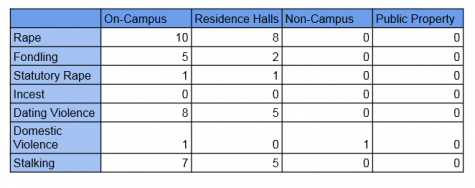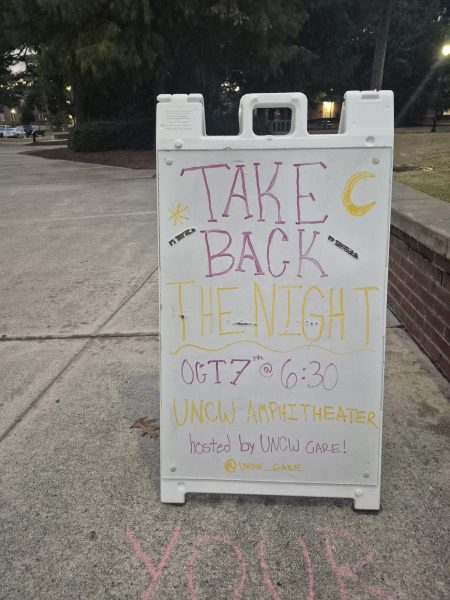Advocacy for the accused?
A national shift in the narrative regarding Title IX and its impact on UNCW.
Casey McAnarney | The Seahawk
UNCW’s Office of Title IX & Clery Compliance is located in DePaolo Hall.
It was September 2017 when United States Secretary of Education Betsy DeVos spoke to a crowd at George Mason University about sexual assault on college campuses.
“There is no way to avoid the devastating reality of campus sexual misconduct: lives have been lost. Lives of victims. And lives of the accused,” said DeVos to a room of university students, according to the Washington Post.
This statement, made nearly six months ago, led to a shift in the narrative presented by colleges and universities around the country regarding sexual assault on campus.
UNC Wilmington was not immune to this change.
In the wake of DeVos’s comments, the U.S. Department of Education Office for Civil Rights issued a statement saying that they were withdrawing the Dear Colleague Letter on Sexual Violence, which has been in place since April of 2011.
The Dear Colleague Letter on Sexual Violence acted as a guideline for colleges and universities nationwide on how to investigate and adjudicate instances of sexual misconduct between students.
Among the mandates included in the Dear Colleague letter was a rule which required schools to “adopt a minimal standard of proof,” known as the preponderance of evidence standard, when it came to adjudicating cases of sexual misconduct.
This rule essentially separated the process of school sexual misconduct hearings from the procedure of criminal cases, which occur in civil court. Under the preponderance of evidence standard, complainants, or individuals making a sexual assault allegation, were not required to submit the level of proof against their attacker that may be required in a criminal court case.
With the withdrawal of this standard, university Title IX offices around the country are in a holding pattern waiting to see if the guidelines for how to adjudicate cases of sexual misconduct will change.
The reason for the withdrawal of the Dear Colleague Letter was explained by the Assistant Secretary of the Department of Education Candice Jackson, “The 2011 and 2014 guidance documents may have been well-intentioned, but those documents have led to the deprivation of rights for many students – both accused students denied fair process and victims denied an adequate resolution of their complaints.”
The stance taken by the Education Department regarding the denial of fair process to accused students has been heard by many universities including UNCW.
“…on the national level there is much being written about that those who are accused claim they are not being dealt with fairly, that the process sometimes seems to favor the complainant” said UNCW Vice Chancellor Pat Leonard in an interview with The Seahawk.
While Vice Chancellor Leonard and Director of Title IX and Cleary Compliance Amber Resetar both maintained in interviews that the university was dedicated to fairness for all students involved in the process of sexual misconduct cases, UNCW is legally obligated to comply with any changes made by the Department of Education or they run the risk of losing federal funding.
But is the Title IX hearing process at UNCW unfairly biased against students accused of sexual assault, such as DeVos and the Education Department suggest?
In 2017 the University Police Crime Log reported 13 sexual assaults, which occurred on campus. This number does not include any UNCW students who may have been assaulted off campus or students who did not call the police at the time of the assault but reported later.
UNCW’s Title IX office compiles the data regarding sexual misconduct cases involving students both on and off campus. In 2017, there were 77 cases of sexual misconduct reported. Of these 77 instances, the university investigated nine, and one case went to a disciplinary hearing.
Resetar presented the 2017 Clery stats for the upcoming Annual Security Report. These statistics could differ from Title IX counts due to geography and due to definition differences between policy and law, according to Resetar. Resetar also said that these numbers may be different from UNCW’s daily crime log as the daily crime log encapsulates state law definitions and those may differ from the Annual Security Report definitions.

With information provided by Director of Title IX & Clery Compliance Amber Resetar, The Seahawk shows these preliminary numbers of reported cases from 2017.
These are preliminary numbers, Resetar said. “I still have to write letters to local law enforcement both in this area and in the areas where students travel to for short stay-away trips as well as for study abroad trips. I might get statistical data from those sources that could change our numbers. I also spend time with our campus police department to double check our numbers and ensure that we are accurately counting.”
The adjudicated case in question resulted in the accused individual being found “not responsible”.
The new guidelines regarding sexual misconduct cases on college and university campuses will be made public in March 2018.









